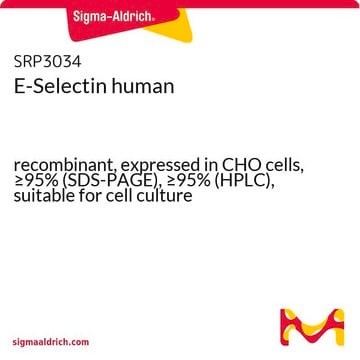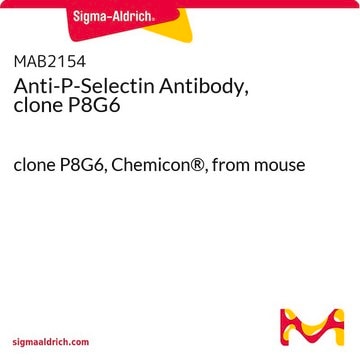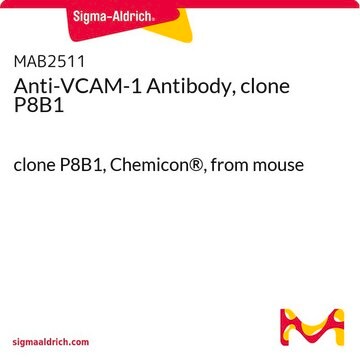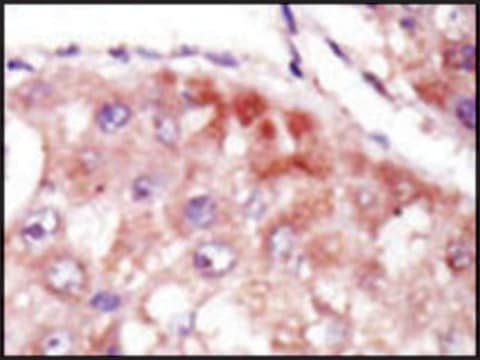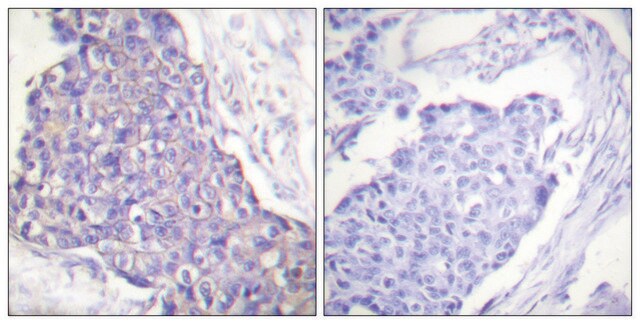S9555
Anti-E-Selectin (CD62E) antibody, Mouse monoclonal
clone 1.2B6, purified from hybridoma cell culture
Synonym(e):
-NotTranslated-
About This Item
Empfohlene Produkte
Biologische Quelle
mouse
Konjugat
unconjugated
Antikörperform
purified immunoglobulin
Antikörper-Produkttyp
primary antibodies
Klon
1.2B6, monoclonal
Form
buffered aqueous solution
Mol-Gew.
antigen 100-115 kDa
Speziesreaktivität
human, pig
Konzentration
~2 mg/mL
Methode(n)
capture ELISA: suitable
flow cytometry: suitable
immunohistochemistry (frozen sections): suitable
immunoprecipitation (IP): suitable
indirect ELISA: suitable
indirect immunofluorescence: 1-2 μg/mL using using 293-T cells transfected with E-selectin fusion protein
western blot: suitable (non-reduced)
Isotyp
IgG1
UniProt-Hinterlegungsnummer
Versandbedingung
dry ice
Lagertemp.
−20°C
Posttranslationale Modifikation Target
unmodified
Angaben zum Gen
human ... SELE(6401)
Suchen Sie nach ähnlichen Produkten? Aufrufen Leitfaden zum Produktvergleich
Allgemeine Beschreibung
It is a 140KDa protein mainly expressed in endothelial cells. E- selectin is characterized with an N-terminal domain, epidermal growth factor (EGF)-like domain, lectin (ligand-binding) domain, variable short consensus repeats and transmembrane domain.
Spezifität
Immunogen
Anwendung
Biochem./physiol. Wirkung
Zielbeschreibung
Physikalische Form
Lagerung und Haltbarkeit
Haftungsausschluss
Not finding the right product?
Try our Produkt-Auswahlhilfe.
Lagerklassenschlüssel
10 - Combustible liquids
WGK
WGK 3
Flammpunkt (°F)
Not applicable
Flammpunkt (°C)
Not applicable
Analysenzertifikate (COA)
Suchen Sie nach Analysenzertifikate (COA), indem Sie die Lot-/Chargennummer des Produkts eingeben. Lot- und Chargennummern sind auf dem Produktetikett hinter den Wörtern ‘Lot’ oder ‘Batch’ (Lot oder Charge) zu finden.
Besitzen Sie dieses Produkt bereits?
In der Dokumentenbibliothek finden Sie die Dokumentation zu den Produkten, die Sie kürzlich erworben haben.
Unser Team von Wissenschaftlern verfügt über Erfahrung in allen Forschungsbereichen einschließlich Life Science, Materialwissenschaften, chemischer Synthese, Chromatographie, Analytik und vielen mehr..
Setzen Sie sich mit dem technischen Dienst in Verbindung.![Anti-CD62E [ELAM-1] Antibody, clone 1.2B6 clone 1.2B6, from mouse](/deepweb/assets/sigmaaldrich/product/images/224/939/8a711839-25ef-4e45-badd-208503950c8a/640/8a711839-25ef-4e45-badd-208503950c8a.jpg)
